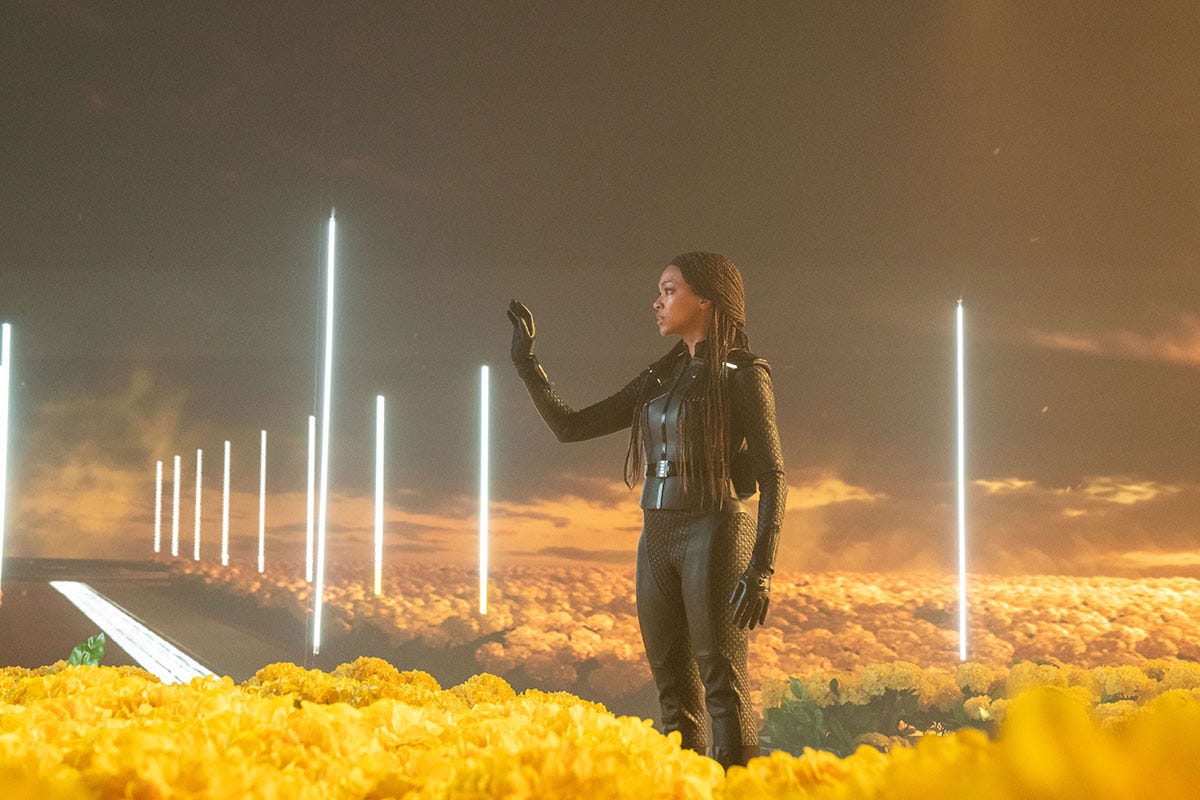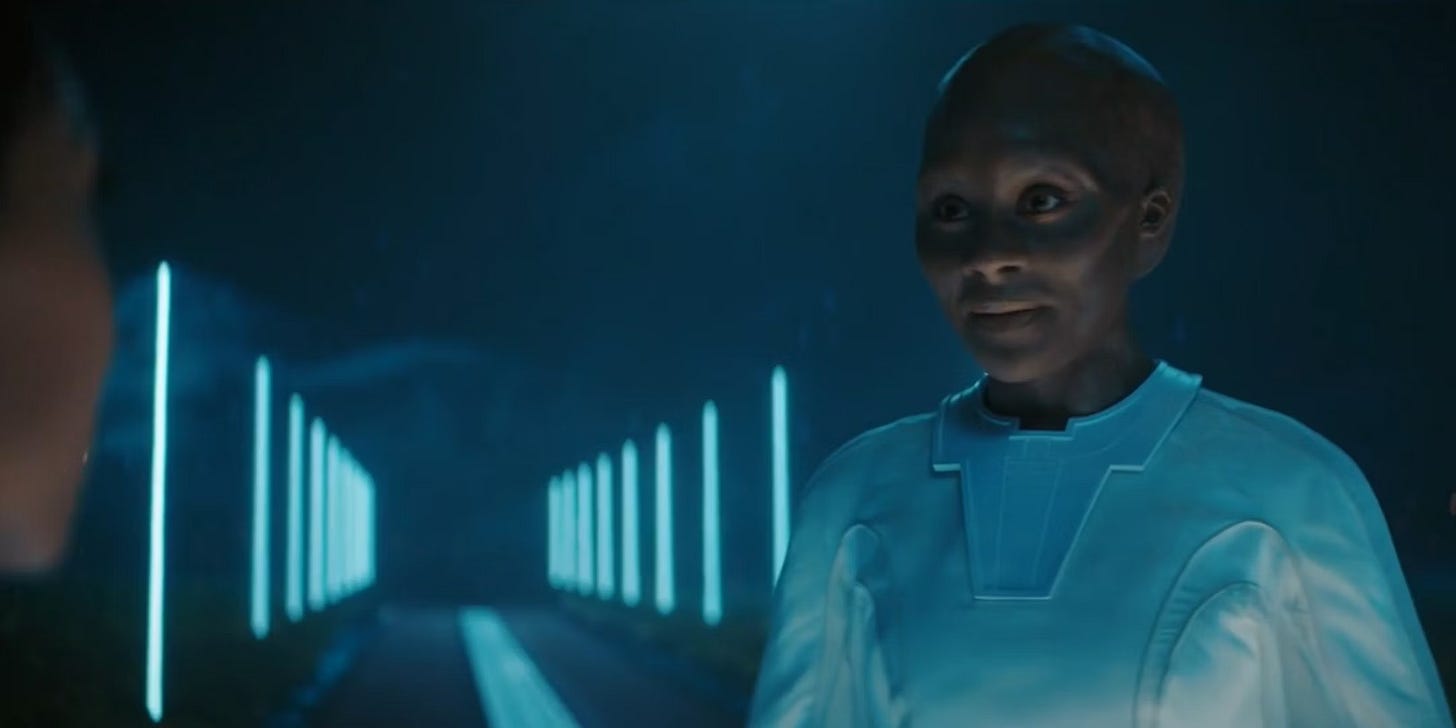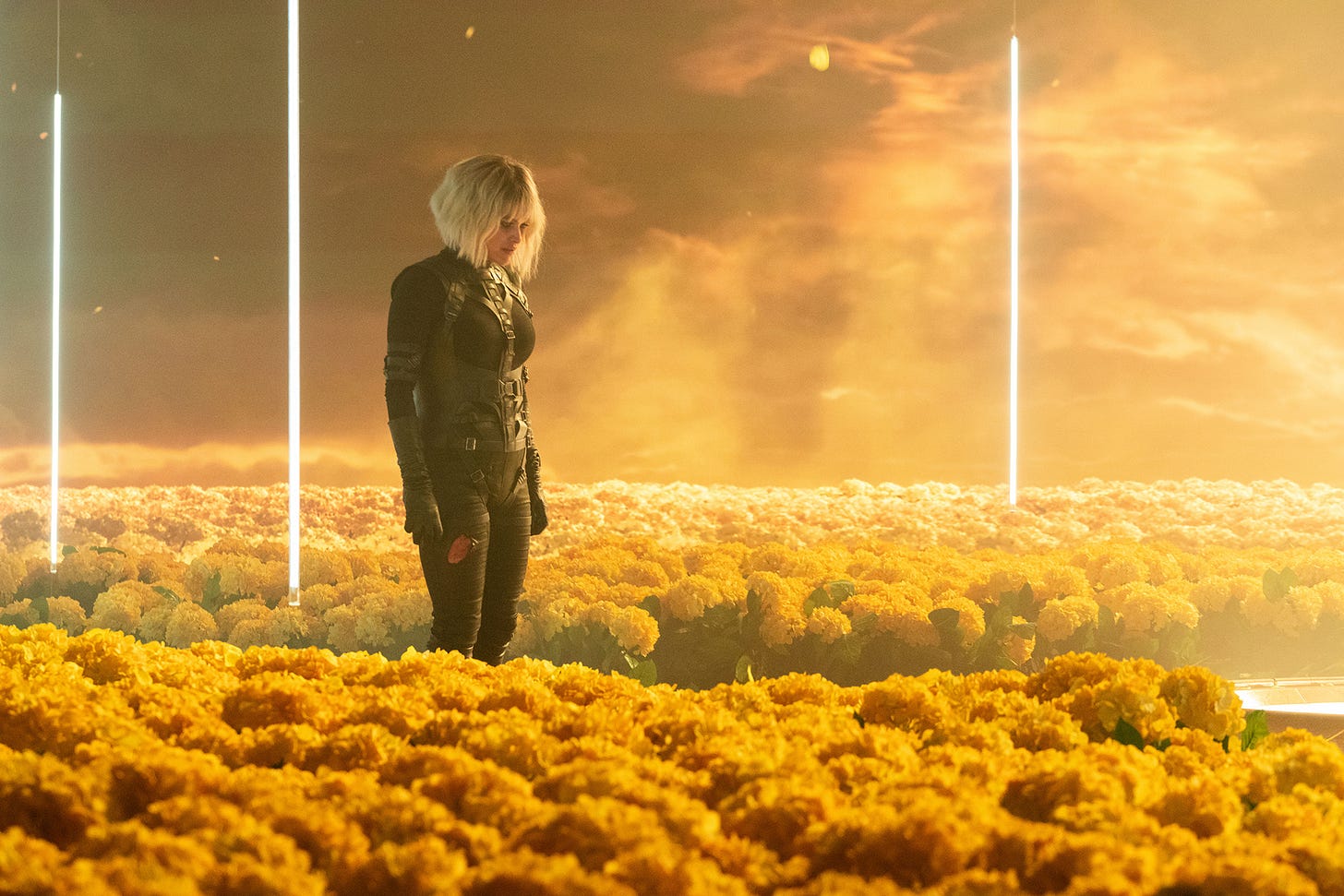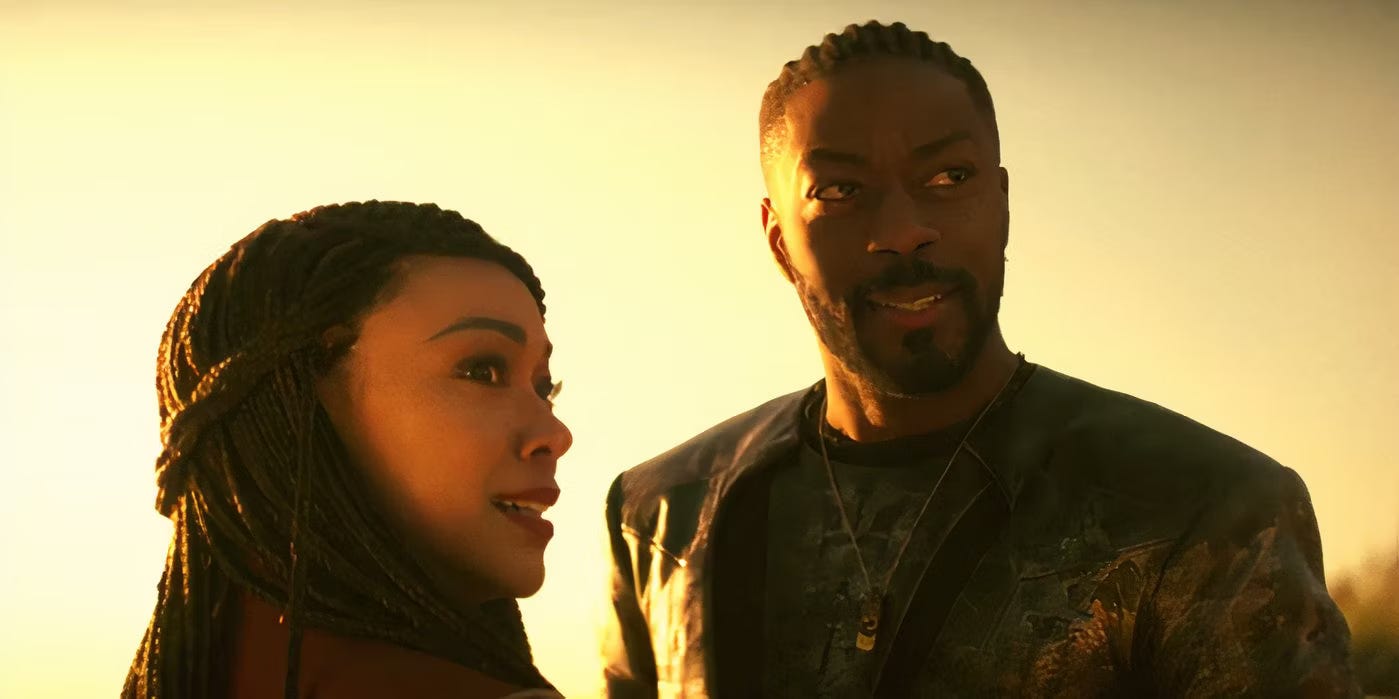Star Trek: Discovery's Series Finale and What It All Means
"Life, Itself" tries to answer the big questions about the show and existence with mixed results
CAUTION: This piece contains major spoilers for S05E10 of Star Trek: Discovery - “Life, Itself”
Eight years. Five seasons. Four captains. One ship. One infamous mutineer turned galactic hero. And I still don’t quite know what Star Trek: Discovery means.
That's alright! The show has seen multiple showrunners and various creative voices at play. The series reset its premise at least once, with the jump to the far future, and arguably multiple times. Characters have come and gone. Ships have been retrofitted and become sentient. Species new and old have phased in and out of focus.
It’s okay if, after all that, even the habitually overthinking viewer can't boil the robust (if not quite infinite) diversity of Discovery into a single idea or takeaway. At the beginning of the show’s ultimate season, Michael Burnham herself wondered what it all means. I’ll admit, I’m not more equipped to answer that after the end of the show’s five year mission than she was when it started.
However, what it means in immediate terms is that the Progenitor mystery is finished. Michael and Moll’s twin journeys into the portal (alongside some disposable Breen mooks) leads them to a liminal space, fit for slow-motion special effects, gravity-defying fisticuffs, and cheap puzzle-solving.
Much of that feels a little gratuitous. You can practically feel the episode showing off instead of advancing the story. Why Burnham and Moll need to have a Matrix-esque anti-gravity brawl before the plot-mandated alliance and sudden-but-inevitable betrayal is beyond me. But I like the setting and the slower pace the show adopts within it. Despite the questionable “movie every week” promise of the series, this is the rare instance where Discovery genuinely feels cinematic, and the pace and cinematography have a lot to do with that.
That extends to the look of the Progenitors’ special realm, which doesn’t disappoint. One of the big problems with Discovery’s aesthetic overall is that the sterile sheen on everything often gives the show’s backdrops a semi-unreal quality. That antiseptic look detracts from the convincingness of the presentation. Thankfully, it totally works for the liminal qualities of a quasi-magical portal realm created by billion-year-old aliens!
The endless stretch of a fantastical environment, the way it’s punctuated by extravagant quasi-baroque architecture, the hidden path to central setting, the puzzle that leads you to some mystical parental figure spouting purple prose -- they all give “Life, Itself” an unexpected Kingdom Hearts vibe of all things. But for something meant to be elevated above even the everyday wonders the average Starfleet captain experiences, the approach works.
Granted, some of the path toward the Progenitor tech feels rote. All of the cryptic clues and vital totems come down to...arranging a bunch of glass triangles? You can derive some thematic meaning from that (“The in-between times matter as much!”) but it’s an oddly mechanical answer to the latest riddle. Moll giving Michael the ol’ El Kabong and getting punished by the alien alarm is a bit too predictable. And the all-knowing ethereal being from beyond, come to dispense the great wisdom, is a tired cliche.
Nonetheless, I like where the finale lands with all of this. The rap on Michael Burnham in the fandom is that Discovery is too hidebound in its need to make her the greatest and special-est captain to ever captain anything. (Nevermind that the franchise has done the same with Kirk, Archer, and if I’m honest with myself, sometimes even Picard.) Here, though, when the Progenitor representative tells Burnham that she is the only one worthy to wield such incredible technology, Michael herself demurs.
Burnham acknowledges her own flaws. She points out her own limitations. True to Federation principles, she disclaims the idea that any one person should have this power. And given the freedom to create life, or annihilate it, or use this amazing tool however she might wish, Burnham chooses to destroy it.
There is poetry in that. It’s a strange obverse of Groucho Marx’s famous quip, 'I wouldn't want to belong to a club that would have me as a member.” The trails of clues left by the consortium of scientists was meant to test the mettle and the heart of the person chasing them, ensuring that they had the right disposition and perspective before they were granted access to this awesome power.
I can appreciate the irony that the only soul worthy of wielding that technology is the one who would see its potential for death and destruction and, instead, choose to destroy it. It’s a conclusion to this story that, if a bit anticlimactic, feels lyrical, philosophical, and most importantly, Trek-y enough for a finale.
Unfortunately, it squeezes out just about everything else. Dr. Culber’s peculiar spiritual connection? Well, he magically knows the frequency for the portal box, and is simply content with the great unknowns now. The End. Remember Stamets’ fervent desire to leave a great scientific legacy? Well, all it takes is a twenty-second speech from Burnham and a quick (and admittedly sweet) bit of solace from Adira, and he’s completely good now. As for Adira themself? They get another attaboy and a few hugs, but I guess they mostly completed their arc in the last episode.
Okay, how about Rayner? He offers a bold solution to the stand-off with the Breen and remains steady in the face of danger, but doesn’t confront his onetime tormentor, and again, pretty much wrapped up his character arc last week. Tilly? She comes up with a neat science-y thing, which is on-brand, I guess. But her soul-searching over guiding young cadets at the Academy leads to...a mentorship program? Really? That bog standard thing is her big epiphany? Sure. Why not, I guess. Even Moll goes from being murderous and duplicitous to being amenable to Michael and cool with Book without much compunction -- another major character arc that feels terribly compressed.
Look, it’s admirable that Discovery wants to give all the members of its crew something to do in the finale. But unfortunately it means that almost nobody besides Burnham gets a chance to really put a capstone on their journeys across the course of the series. That tack may be fine for well-liked but sporadic recurring characters like Admiral Vance, President Rilak, Commander Nhan, and President T’Rina. (We even learn that Kovich is freakin’ Agent Daniels from Star Trek: Enterprise, among other personae.) But ironically, in an episode about how Burnham has the humility to step aside on the brink of extra-dimensional anointing, her story crowds out everyone else’s.
Thankfully, the exception to the rule is Saru. One of the iconic moments in the lead-up to Discovery’s premiere was his trailer-worthy line that his people were “biologically determined for one purpose and one purpose alone: to sense the coming of death.” When the series started, there was a timidity and a rigidity to Saru. Despite escaping to the stars, he struggled with the fear-based social conditioning within him.
And yet, over the course of the series, Saru arguably evolved more than anyone else on the roster. He lost his ganglia and lived to tell the tale. He shared the truth of his homeland and rekindled his people’s culture. He’s been through an array of harrowing, potentially lethal events and come out on the other side stronger and more self-assured. Heck, he’s even found courage in matters of the heart and, ultimately, true love.
So it is rousing, then, when the once-anxious Saru stands off with a cruel Breen warlord and doesn’t blink once. Where there was fear, there is now force. Where there was reticence, there is now courage. Where there was trepidation, there is now daring. Doug Jones kills it, as usual, and if there’s one thing this finale deserves credit for, it’s showing how far Saru has come: from the anxious officer preaching caution to the confident ambassador making bold bluffs to save his friends on the strength of his mettle alone. He’ll go down as the show’s best character in my book, and I’m glad “Life, Itself” gave him his moment in the spotlight.
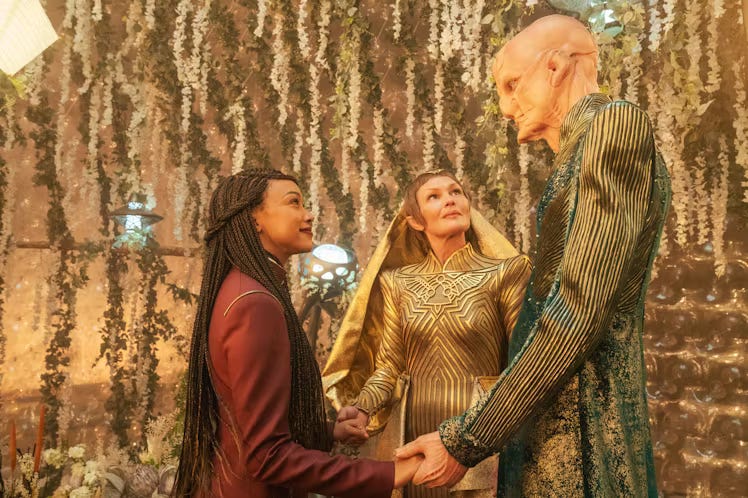
Despite some overcrowding, the episode does at least have a solid structure to keep things manageable. We have Burnham and Moll going through the Door to Darkness on the one hand. We have Rayner and most of the usual Discovery crew working to hold off Moll’s goons from the Progenitor device on the other. We have Saru and Nhan holding off another Breen faction with trademark Federation diplomacy. And we have Book and Dr. Culber sneaking through battle lines in a shuttle to keep the “portal in a can” from drifting into a pair of twin black holes. The balance isn’t always perfect, but the different story threads are enough to provide some handles for the audience in an extra-long, extra-bombastic swan song.
The mission to keep the portal from plummeting across the event horizon last part is a big part of the episode’s focus. It’s not because of the practical mechanics of destruction-avoidance that have become old hat for Discovery. Rather, it’s because it’s a sign of Book’s abiding love for Michael. And sure. I buy it. But I don’t feel it.
Look, I don’t mind Book and Burnham together. It’s not a detriment to the show in any sense. But from the second Book popped up in season 3 as an obvious love interest, everything about them has felt pat and inevitable. So while the pair are perfectly fine and plausible together, their romance never felt like the epic, essential love story that the show seemed to want it to be, especially in this final outing.
I won’t deny the aesthetic power of the two of them reuniting at Saru’s wedding all gussied up. (The nuptials look incredible, by the way.) I’m not made of stone. You put two attractive people gazing deeply into one another’s eyes on a luminous beach with the music swelling, and you can provoke something in the moment. But they mostly spout the usual romantic cliches, made all the more stilted with oddly artless dialogue, before the romantic rekindling that was never really in doubt reaches its predictable conclusion.
Which means our epilogue, showing their shared future in the galaxy’s coziest cabin, is pleasant but not quite moving. It’s nice that Burnham gets a little peace, that she and Book have a son on the cusp of his first Starfleet command, that she gets one last dance with Discovery. But that's about where it tops out. “Nice.” Not the touching goodbye to a long run the episode seems all but desperate to convey.
The finale tries! We even get an impressionistic sequence on the bridge that feels more like the cast bidding farewell to one another in costume than the characters saying their goodbyes. You can appreciate the attempts at something deeper and more moving. “Life, Itself” pulls out all the stops: from yet another explosion-filled crescendo, to a Tree of Life-esque sequence depicting creation, to an artsy golden-hued effort to gin up the emotion. The commendable work to place a worthy capstone on five seasons’ worth of adventures is evident. There are some big swings here, which I admire, and you cannot fault the show for a lack of effort in this finale.
But in the final tally, it still leaves me a bit cold. And more to the point, I’m still not quite sure what it all means. In the Progenitor’s grand sermon, she suggests a positively existentialist reading on that question on a cosmic scale. In a universe with no inherent meaning, we supply our own, whether it be through interstellar exploration, or scientific advancement, or familial bonds. In her estimation, there is no one-size-fits-all answer to such a monumental query.
Star Trek: Discovery makes a few vague suggestions as to the possible takeaways, but affirms that the franchise’s values of infinite diversity in infinite combinations applies just as well to one of the essential questions of life. There are a multitude of meanings and possibilities out there, in the wide scope of people out in the world (or the galaxy), and in what drives us within our hearts and souls. I can appreciate that response to the question posed.
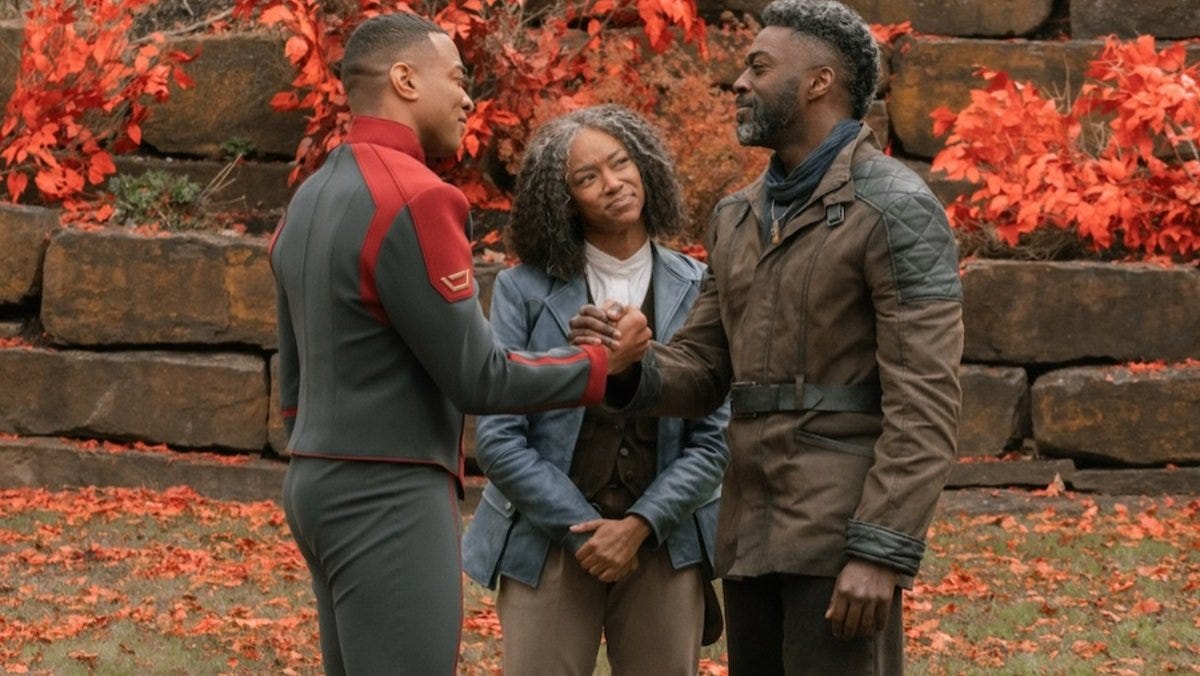
But the closest thing the show offers to an explicit answer comes from Burnham herself, naturally, and the episode’s title. The meaning of life is “Life, Itself”, with the idea that our experiences can't be reduced beyond that, necessarily. The purpose is simply to be, to form bonds, to have those experiences, and share them with others. It’s a bit of a tautology, and more than a little trite, but there’s something to the idea that the meaning of life is, well, to live.
That meaning extends to Discovery itself. I can't tell you what the show means, or how it coalesces into a greater whole, because quite frankly, I’m not sure that it does.. Instead, it simply is. These adventures happened: some good, some bad, some rousing, some dull, some memorable, some easily forgotten.
It’s a fool’s errand to predict a show’s legacy. From aspiring franchise flagship, to fandom punching bag, to something that was simply there, Discovery’s risen and fallen in esteem over the course of its run. It could earn a critical reevaluation down the line or just as easily sink down into the dregs like some of its predecessors.
But through it all Star Trek: Discovery was there. It delivered five seasons’ worth of adventures, expanded the canon, and took the franchise further into the future than it had ever been before. The series’ whole may not amount to more than the sum of its parts, but those parts, those individual adventures and stories, will remain. I’m not sure if in the totality of its run, Discovery has a deeper meaning than that, or if it needs one.




